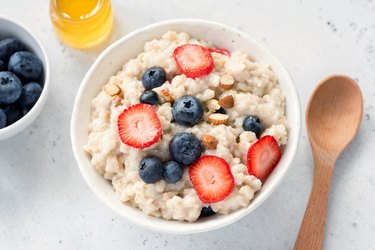
When you're looking to upgrade your diet, breakfast is a good place to start. Many typical breakfast foods — pancakes, muffins, waffles and bacon — are high in fat, sugar and simple carbs that give you an immediate rush of energy but leave you feeling flat by mid-morning. Fruit, on the other hand, is a rich source of carbohydrates, fiber, vitamins and minerals that fill you up and give you energy. Pair fruit with a source of lean protein for a day that's off to a great start.
Fruit in the Morning
Video of the Day
The secret to a satisfying breakfast that ticks all the nutritional boxes and keeps you going until lunch is choosing a combination of foods that provide:
Video of the Day
- Complex carbohydrates, which provide long-lasting energy as well as fiber to fill you up
- Lean protein, which is the most satiating macronutrient to keep you feeling full until lunch
- Healthy fats that provide energy and satiety
Fruit is a healthy way to get complex carbs. Although fruits are rich in naturally occurring sugars, they're considered complex carbs — not simple carbs — because they contain dietary fiber. Fiber is the parts of plants that pass through your system mostly undigested. Fiber adds bulk to foods and slows digestion and absorption of the fruit sugars to provide long-lasting energy.
Read more: Is the Sugar in Fruit Bad for You?
Nutrition of Various Fruits
Eating fruit will help you meet your daily nutrition goals. Along with dietary fiber, fruit is also a rich source of vitamins A and C and the mineral potassium. Vitamin C is important for the health of your immune system and the growth and repair of cells; vitamin A boosts skin and eye health and fights infection; and potassium helps control blood pressure.
According to the Institute of Medicine, men need 38 grams of fiber and women need 25 grams of fiber each day. One cup of fresh blueberries contains only 84 calories and 3.6 grams of fiber — 9 to 15 percent of your daily fiber needs. One medium apple with skin contains even more fiber — 4.4 grams — and one medium banana provides 3.1 grams.
The recommended daily intake of vitamin C is 90 mg for men and 75 mg for women. One cup of blueberries provides 14.4 mg; one medium apple has 8.4 mg; and one medium banana contains 10.3 mg. You'll get between 9 and 19 percent of your daily vitamin C depending on the fruit you choose and whether you're male or female.
For vitamin A, the recommendation is 700 mcg for women and 900 mcg for men. A cup of blueberries provides 80 mcg; a medium apple offers 98 mg; and a medium banana contains 76 mcg.
All adults need 4,700 mg of potassium each day. Bananas are one of the best sources of potassium, and one medium banana provides almost 10 percent of the daily requirement. A medium apple contains 195 mg, and a cup of blueberries offers 114 mg.
A Low-Calorie Addition
Many fruits are low in calories compared to the volume of food they provide. Strawberries, grapefruit, peaches, papaya and cantaloupe all provide fewer than 60 calories per serving. You can indulge in these sweet treats each morning without going over your breakfast calorie budget.
Other fruits are higher in calories, which is good to know if you're watching your weight. Mangos, grapes, cherries and bananas have more calories and sugar and should be eaten in moderation. A whole mango, for example, provides 45 grams of sugar. Although it's natural sugar, it still adds to your total calorie intake for the day.
The Perfect Pairing
Some delicious fruit combinations include strawberries, raspberries and blueberries; grapefruit, kiwi and strawberry; and blackberries, papaya and cantaloupe. Slice up your favorites and serve them topped with plain Greek yogurt packed with protein, a piece of whole-grain toast with unsweetened nut butter or an egg any way you like it.
Read more: Top 10 Healthiest Fruits & Vegetables
- National Association of Physical Literacy: Carbohydrates
- The American Journal of Clinical Nutrition: Protein, weight management and satiety
- Fat Detection: Taste, Texture and Post Ingestive Effects: Chapter 15 Fats and Satiety
- UCLA: The Complexities of Carbs
- NutraIndia Summit: Role of Dietary Fibres in Nutrition
- Extension: What Are the Key Nutrients in Fruits and Vegetables?
- The National Academies of Sciences, Engineering and Medicine: Dietary Reference Intakes: Macronutrients
- USDA: National Nutrient Database: Blueberries, raw
- USDA: National Nutrient Database: Apples, raw, with skin
- USDA: National Nutrient Database: Bananas, raw
- National Academies of Sciences, Engineering and Medicine: Dietary Reference Intakes (DRIs): Recommended Dietary Allowances and Adequate Intakes, Vitamins
- WebMD: Get Something for Nothing: 25 Nearly Calorie-Free Foods
- WebMD: Which Fruits Have the Most Sugar?